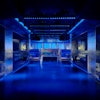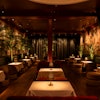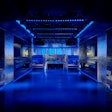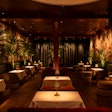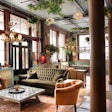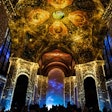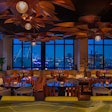We're sorry, New York event planners. We read the law, investigated your defenses, and checked with the mayor's office: Allowing guests to smoke indoors while toasting the launch of the latest magazine or promoting a new product is about as legal as puffing on a Macanudo in the middle of your office.
Yet at many events it seems as if nothing has changed. Paper and Armani Exchange co-hosted a party in the fall where the invitation even bragged that smoking would be allowed. We've seen guests lighting up at various parties in clubs. And in February, at the Frick Collection's annual benefit, planners turned a garden into a tented cigar bar. (A tent or any other type of ceiling enclosure makes an outdoor smoking lounge illegal.) A similar infraction occurred at the launch party for Cargo at Splashlight Studios, where bartenders passed out cigarettes inside a tented outside space. When asked for comment, Cargo's PR rep deferred to Splashlight, and Benoit Lagarde, the studio's chief operating officer, said he had no idea he was breaking the law.
Many event professionals believe the industry falls into a gray area. They're able to find loopholes in the law, they say, because their parties are at private venues. "Private events spaces are not subject to the bar laws," said one event manager in the publishing industry. Wrong answer. In fact, it doesn't matter if the space is public or private. What matters is whether paid employees are there. The law was implemented with their lungs in mind.
Of course, understanding the law requires one to follow it. But when planners find guests smoking, the decision about what to do with them isn't so clear. Take it from Leslie Short, president of marketing, advertising and PR for FUBU the Collection/FB Entertainment and owner of K.I.M. Media, a marketing, PR and special events firm. "What do you do?" Short says. "You have no choice [but to enforce the law] and you usually don't have room [for smokers] out front. The sidewalk is your best friend and you have to pray there isn't another building next door that's going to be upset that people are out front."
How are venues handling the ban? Most of the owners we spoke to say they have made the no-smoking policy clear by removing ashtrays and alerting employees to keep the smokers outside. Of course, some guests play along and others keep puffing, following the thinking that a law isn't a law until there's reason to believe breaking it could get them into trouble (read: kicked out). Noah Tepperberg, one of the owners of Marquee in Chelsea, says employees stamp smokers who want to leave the party for a quick puff. The club also recently rented a portion of the parking lot adjacent to its property and turned it into a smoking patio. "It's a more private area for smokers so they don't have to stand in a sectioned-off area of the street," Tepperberg says.
The ban is also changing contracts. Protecting themselves against a potential crackdown, venues are inserting stipulations that make the planners responsible for fines. "It's somewhat common now in New York," says FUBU's Short. "So if I get one of those contracts, I'll personally go up to [a guest who is smoking] and say, 'You and I are going to have to pay this fine together, so help me do my job tonight.' Or I'll say, 'Follow me, and we'll find an alley.'" (When we asked Elliott Marcus, assistant commissioner with the Bureau of Food Safety and Community Sanitation, responsible for the section of the Department of Health that enforces the Smoke-Free Air Act, who would get the violation—the venue or the planner—he said, "We may fine both.").
The good news is that city health officials say the Smoke-Free Air Act is a self-enforcing law. They respond to complaints received through the city's 311 line, the health department Web site, or the city's Web site. An inspector popped in on the St. Regis in March after The New York Post reported that guests smoked cigars during a Wall Street soirée attended by Mayor Michael Bloomberg—the anti-smoking law's leader, remember—and a complaint was logged with the city. The surprise visit yielded no smoking violations. But the hotel did get nailed for two minor sanitary violations, including a bowl of uncovered granola. ("They arrived during breakfast service," said Teresa Delaney, the hotel's director of public relations. "So obviously if you go through the kitchen and we're still serving, a container might be open.")
In addition to inspections prompted by complaints, any place that qualifies as a food establishment is subject to routine inspections, but they typically inspect during the day. Bottom line: A Bloomberg intern posing as a party guest isn't likely to bust through your velvet ropes any time soon.
Until then, the decision about whether to smoke will most likely be left up to the client—not the law. "Someone has paid for that space so they should choose how they want to use it," says Karrie Goldberg, C.E.O. of Kage Konsulting, who consults with several New York event spaces. "You can't slaughter an animal in there, but if you want to have a cigarette, go for it."
—Michele Marchetti
This story originally appeared in the spring 2004 issue of the BiZBash Event Style Reporter newspaper.
Yet at many events it seems as if nothing has changed. Paper and Armani Exchange co-hosted a party in the fall where the invitation even bragged that smoking would be allowed. We've seen guests lighting up at various parties in clubs. And in February, at the Frick Collection's annual benefit, planners turned a garden into a tented cigar bar. (A tent or any other type of ceiling enclosure makes an outdoor smoking lounge illegal.) A similar infraction occurred at the launch party for Cargo at Splashlight Studios, where bartenders passed out cigarettes inside a tented outside space. When asked for comment, Cargo's PR rep deferred to Splashlight, and Benoit Lagarde, the studio's chief operating officer, said he had no idea he was breaking the law.
Many event professionals believe the industry falls into a gray area. They're able to find loopholes in the law, they say, because their parties are at private venues. "Private events spaces are not subject to the bar laws," said one event manager in the publishing industry. Wrong answer. In fact, it doesn't matter if the space is public or private. What matters is whether paid employees are there. The law was implemented with their lungs in mind.
Of course, understanding the law requires one to follow it. But when planners find guests smoking, the decision about what to do with them isn't so clear. Take it from Leslie Short, president of marketing, advertising and PR for FUBU the Collection/FB Entertainment and owner of K.I.M. Media, a marketing, PR and special events firm. "What do you do?" Short says. "You have no choice [but to enforce the law] and you usually don't have room [for smokers] out front. The sidewalk is your best friend and you have to pray there isn't another building next door that's going to be upset that people are out front."
How are venues handling the ban? Most of the owners we spoke to say they have made the no-smoking policy clear by removing ashtrays and alerting employees to keep the smokers outside. Of course, some guests play along and others keep puffing, following the thinking that a law isn't a law until there's reason to believe breaking it could get them into trouble (read: kicked out). Noah Tepperberg, one of the owners of Marquee in Chelsea, says employees stamp smokers who want to leave the party for a quick puff. The club also recently rented a portion of the parking lot adjacent to its property and turned it into a smoking patio. "It's a more private area for smokers so they don't have to stand in a sectioned-off area of the street," Tepperberg says.
The ban is also changing contracts. Protecting themselves against a potential crackdown, venues are inserting stipulations that make the planners responsible for fines. "It's somewhat common now in New York," says FUBU's Short. "So if I get one of those contracts, I'll personally go up to [a guest who is smoking] and say, 'You and I are going to have to pay this fine together, so help me do my job tonight.' Or I'll say, 'Follow me, and we'll find an alley.'" (When we asked Elliott Marcus, assistant commissioner with the Bureau of Food Safety and Community Sanitation, responsible for the section of the Department of Health that enforces the Smoke-Free Air Act, who would get the violation—the venue or the planner—he said, "We may fine both.").
The good news is that city health officials say the Smoke-Free Air Act is a self-enforcing law. They respond to complaints received through the city's 311 line, the health department Web site, or the city's Web site. An inspector popped in on the St. Regis in March after The New York Post reported that guests smoked cigars during a Wall Street soirée attended by Mayor Michael Bloomberg—the anti-smoking law's leader, remember—and a complaint was logged with the city. The surprise visit yielded no smoking violations. But the hotel did get nailed for two minor sanitary violations, including a bowl of uncovered granola. ("They arrived during breakfast service," said Teresa Delaney, the hotel's director of public relations. "So obviously if you go through the kitchen and we're still serving, a container might be open.")
In addition to inspections prompted by complaints, any place that qualifies as a food establishment is subject to routine inspections, but they typically inspect during the day. Bottom line: A Bloomberg intern posing as a party guest isn't likely to bust through your velvet ropes any time soon.
Until then, the decision about whether to smoke will most likely be left up to the client—not the law. "Someone has paid for that space so they should choose how they want to use it," says Karrie Goldberg, C.E.O. of Kage Konsulting, who consults with several New York event spaces. "You can't slaughter an animal in there, but if you want to have a cigarette, go for it."
—Michele Marchetti
This story originally appeared in the spring 2004 issue of the BiZBash Event Style Reporter newspaper.



